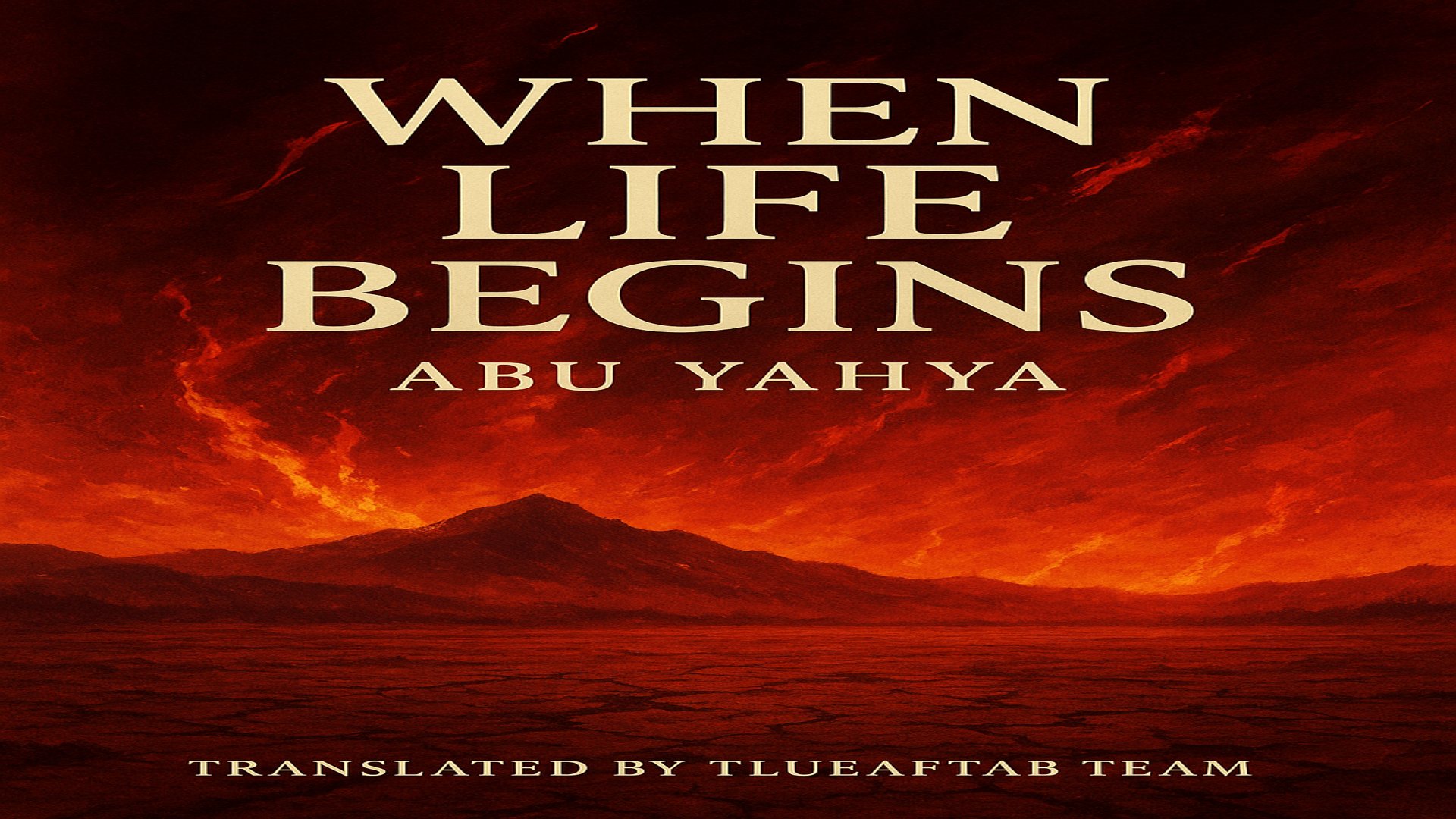Abu Yahya (Translated By Tlueaftab Team)
On our way back, I said to Saleh,
“In this life, families will be torn apart. Some husbands will remain behind, some wives will remain behind.”
“Yes,” Saleh replied, “that will happen. The chance to move forward was in the world that has already passed. Here, whoever is left behind is left forever. But remember, no one will be left alone here, and no one will wait for those who stayed behind. New relationships will come into being. New pairs will be formed, new marriages will take place. But here there will be no families as there used to be in the world. You understand correctly — in the world, the institution of family was created because of certain weaknesses of human beings. The primary purpose of family was to raise children and to care for the elderly.
To strengthen and stabilize this institution, men were made the heads of families. To keep the family tied together, women were made weaker than men in many aspects, while men were made instinctively dependent on women. Women were both a blessing and a necessity for men, without whom the world’s system could not run. But now things will be different. Here, women will remain a blessing for men, but they will not be dependent upon men. That is why their value will greatly increase, and so will their dignity.
It means that in this world, being a woman is more advantageous. Whenever a woman desires, she can gain a man’s attention. But men will have no authority over women, even though they will be in need of them.”
“So we men will be at a loss then?” I asked.
“Yes, you men will be at a loss.”
“That sounds like a big problem. Is there any solution?”
Saleh smiled. “In Paradise there is a solution for everything. The solution for this is the houris.”
“But won’t women feel jealous of them?” I asked.
“No,” Saleh replied firmly. “That will not happen. Houris can never reach the status and beauty of the women of Paradise. The women of Paradise will be far more beautiful and hold a much higher rank because of their righteous deeds. Therefore, they will never feel envy regarding the houris or their husbands’ interests. And remember — Paradise is not man’s world; it is God’s world. Do you know the difference between the two?”
I silently looked at him. He himself answered,
“In man’s world, a rival is envied. But in God’s world, even a rival becomes beloved.”
“That’s amazing,” I admitted. “But ultimately, the decision rests with the women of Paradise themselves.”
Saleh explained, “Paradise is the abode of the pure. Out of God’s mercy, no negative feeling will ever come near them. The truth is, you are still under the influence of the human world. That was the world of trial, where both positive and negative emotions were placed inside man. From within the human personality arose anger, jealousy, arrogance, hatred, lies, oppression — and it was every believer’s duty to cleanse himself of these inner impurities.
Just like the body expelled filth such as sweat, urine, and excrement — and you were commanded to purify yourselves with water — so too were these inner impurities meant to be cleansed with the water of patience and endurance. Believers struggled all their lives with this. But today, they will be freed from every such struggle.”
“You mean?” I asked.
“I mean that now neither will their bodies expel filth, nor will their hearts give rise to negative thoughts or emotions. Paradise is a place for beautiful people, where no ugly feeling can survive.”
I then said jokingly, “So it turns out the houris are actually inferior to the women of Paradise and only exist for ‘managing purposes.’ That’s why the women of Paradise won’t envy them. Yet Muslims in the world became obsessed with their beauty, and for no reason, people taunted them about it.”
Saleh grew serious.
“You are mistaken in both your assumptions. First, in Paradise, men will no longer be such precious possessions for women that they would envy anyone over them. Second, don’t belittle the houris as inferior or merely tolerable. They are not equal to the women of Paradise, but they are also not to be looked down upon.”
“Then what are they like?” I asked curiously.
Saleh began to describe:
“They are the final expression of feminine beauty, the ultimate masterpiece of physical perfection. Their matchless beauty does not depend on makeup, powders, flowers, pearls, or jewelry. Creation itself lends all of its beauty to form them — flowers give their colors, the wind its gentleness, rivers their flow, the earth its steadiness, stars their sparkle, buds their fragrance, the moon its glow, the sun its rays, the sky its balance, the peaks their heights, and the valleys their depths. When all this combines, a houri comes into being.
Their height is tall, their complexion radiant and glowing. Their skin is flawless and transparent. Their eyes are large and dark, able to shift color according to their dress. Their eyebrows are smooth, their eyelashes long, their gaze modest — but when lifted, it strikes like an arrow straight to the heart. Their foreheads are broad, cheeks radiant, lips delicate as rose petals, and teeth shining like pearls. Their hair is black, soft like silk, and long enough to reach their calves, contrasting beautifully with their fair skin. Their voice is sweeter than song, their words like pearls, their smile beautifies the atmosphere. Their entire being radiates modesty, fragrance, grace, and dignity. Their presence in fine garments and jewels is like a full moon glowing behind clouds.”
“Have you seen them?” I asked.
“No,” Saleh answered. “No one has. I am only describing what we have been told.”
He continued his description, even reciting verses in praise. Listening to him, I said,
“Saleh, this all sounds like exaggeration and fantasy. Yet, if it is a dream, it is a most beautiful dream.”
Saleh replied, “This dream is not over yet. Listen…”
He went on to explain how the existence of a houri is like the flow of a pure river, untouched by impurity, which finally merges into the ocean of righteousness, destined only for the pious and steadfast.
Then I asked, “But are these houris and the young attendants — ghilman — really human?”
“Yes,” he replied, “they are human. The ghilman are boys who will remain eternally youthful, created to serve. Their eternal boyhood ensures they will never need marriage, while the houris will remain at the peak of youth as wives for the people of Paradise.”
After a long discussion, Saleh revealed a deeper truth:
“Do you know, Abdullah, that this Day of Resurrection is not the first time humanity has been gathered? Every human was once created before, in the covenant of Alast (the Primordial Covenant). At that time, every soul was asked whether it was willing to accept the test of living without directly seeing God, but still obeying His commands. The earth and all authority upon it was offered as a trust to whichever creation accepted. All other creatures stepped back in fear, but humanity, out of passion and boldness, accepted.”
He explained how every soul had chosen its own test — some choosing to live in the era of prophets, others as part of the Muslim community, others with simpler tests of innate morality. Each choice determined the kind of trial and accountability they would face in worldly life.
After this long explanation, Saleh concluded:
“The principle is simple — greater guidance means stricter accountability, greater reward, but also greater punishment if neglected. Lesser guidance means lighter accountability. And each person had chosen his path with full knowledge.”
I felt a wave of realization.
“So if I received great guidance in the world, it was because I myself chose it before.”
“Yes,” Saleh replied, “and because you valued it, you have now gained such a high rank. Had you neglected it, your punishment would have been equally severe.”
At this, I exclaimed,
“What a risk I had taken! But indeed, No Risk, No Gain. Now I see what I have earned, and what danger I have escaped!”
Overcome with gratitude, I fell into prostration, thanking my Lord for granting me success in this great trial.
Saleh placed his hand on my back and said gently,
“Abdullah, rise.”
I stood, grabbed his hands, and cried with joy,
“Saleh! Now I will never die. My life will never again see illness, old age, sorrow, grief, or despair. I want to laugh, shout, dance, and proclaim to the whole world: People! I have succeeded! I have succeeded! Today begins my kingdom, today begins my life!”
Saleh looked at me, smiling silently. When I calmed down, he said,
“Life is yet to begin. For now, we must return to the plain of Resurrection. There are many scenes still to witness. God has granted you an extraordinary opportunity. Come, let us go.”
✍🏻📜☜ To be continued…




